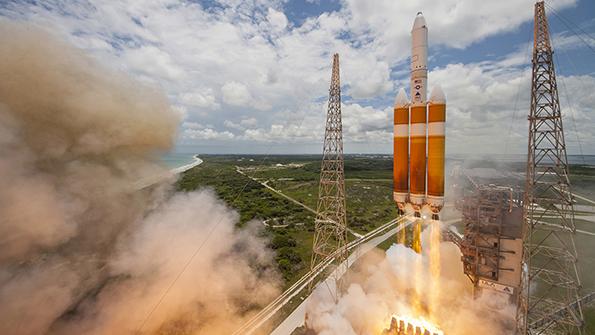Opinion: Three Reforms Essential To Continuing U.S. Space Leadership

No nation, friend or foe, can dispute that the U.S. is back again to lead in space. Unless we learn and act from our victories and missteps, however, we cannot yet take a victory lap because the adrenaline rush will be fleeting. Only if we learn and reform can we continue to remain “Always Above” as the Space Force’s motto goes, to lead limitless economic growth and freedom while standing against those who oppose it.
Continuing to lead the world in the new space race requires three essential reforms that must be implemented immediately. Improving transparency, leveraging commercial innovation and promoting fairness by our government will lead all nations to make this an American space century.
While some technologies and programs must remain highly classified, they are very few compared to what has been institutionalized today. Moreover, plenty of evidence suggests that allowing our adversaries to learn about our true capabilities actually might serve as a strong deterrent to provocative or aggressive behavior.
The apparatus created to protect these projects has metastasized over the decades into dysfunctional jealousy, institutional paranoia and counterproductive tribalism. The Pentagon must review the entire classified space portfolio, set a target for an 80% reduction in six months and unapologetically implement the recommendations.
We must pivot and reverse the obsolete cloak-and-dagger routine that began and was justified with the creation of the National Reconnaissance Office in the 1950s. The compliance bureaucracy to maintain it kills speed, productivity, interagency collaboration, coalition building, all-domain combat effectiveness and economic growth.
The second reform our leaders must undertake is to demand the use of commercially equivalent products and services across all segments of the space business. Establishing a “commercial-first, government-developed-when-necessary” strategy is critical. With requirement certifications at each acquisition milestone, collaborating with the commercial sector is needed to ensure that the visionary leaders have a lever to resist 60 years of inertia.
When the Pentagon upgrades its communication and tech infrastructure, it looks first to the commercial marketplace (Dell, Microsoft, Amazon Web Services, etc.) before developing special-purpose applications. Space system solutions must evolve similarly.
The best way to take advantage of the private capital markets is to be an unambiguous consumer: Buy what you need; do not buy what you do not need. As large as the Space Force budget is, it pales in comparison to the capital markets and is best utilized by buying available systems and services, not developing them. Our strategy should be to leverage the booming private capital 20 times over rather than compete against it.
While the federal government should not compete against private progress, we still must conduct open competitions for space goods and services, regardless of who funded the development. The abuse of sole-source justifications must stop to allow the same unprecedented innovation and cost reductions that are leading the commercial space community into the government’s future.
No-cost Cooperative Research and Development Agreements and competitive demonstrations of products by commercial companies are great ways for the Defense Department to “fly before we buy.”
Gen. D.T. Thompson, the vice chief of Space Operations, remarked that the Space Force “must move faster to counter China.” Next-generation space companies could not agree more. By rewarding rapid delivery “of innovative solutions, competitive costs and real commitment in place of cost overruns and “bridge to nowhere” systems, the government can play to the strengths of its space warfighters.
Declassifying, privatizing and competing routine space missions is fundamental to leading the world into the final frontier. Leveraging this new era of exponentially growing commercial companies will minimize suspicion among nations and encourage economic and scientific exploration for generations to come.
Charles Beames is executive chairman of Colorado-based York Space Systems and chairman of the SmallSat Alliance.
The views expressed are not necessarily those of Aviation Week.


Comments
No bureaucracy could begin such a task in that time frame, let alone finish it.